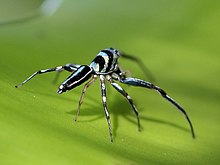Cosmophasis micarioides
| Cosmophasis micarioides | |
|---|---|

| |
| Female | |

| |
| Male | |
| Scientific classification | |
| Domain: | Eukaryota |
| Kingdom: | Animalia |
| Phylum: | Arthropoda |
| Subphylum: | Chelicerata |
| Class: | Arachnida |
| Order: | Araneae |
| Infraorder: | Araneomorphae |
| Family: | Salticidae |
| Subfamily: | Salticinae |
| Genus: | Cosmophasis |
| Species: | C. micarioides
|
| Binomial name | |
| Cosmophasis micarioides | |
| Synonyms | |
| |
Cosmophasis micarioides is a species of jumping spider found in Papua New Guinea, Australia and the Solomon Islands.[1] The common name is sparkling northern jumping spider.[2] When in motion, the male spider bobs its abdomen up and down reflecting sunlight that causes a characteristic sparkle.
Description
[edit]There are significant differences in colour and patterns between male and female Cosmophasis micarioides. The male is black with iridescent bands of blue-green, and has a longitudinal mark on the abdomen. The female is orange-brown with lighter coloured bands of green and brown that lie across the abdomen. The pattern of marks on the female is quite variable and not reliable for identification. The distinguishing feature is that stripes on the side of the head of both sexes reach down to the rim of the carapace, as opposed to the very similar Cosmophasis thalassina where black does not extend as far as the rim. The abdomen of the male is narrower than the female. The subadult male has orange in place of black on top of the carapace. The species is widespread and common in tropical Australia and south to Brisbane.[2] Body length from head to tail is 5 mm (0.20 in) for females and 6.5 mm (0.26 in) for males.[2]
Gallery
[edit]-
Illustration by L. Koch
-
Male from above
-
Black bands reach down to the carapace rim
-
Male in Cairns
-
Female from above
-
Female in Cairns
References
[edit]- ^ a b "Cosmophasis micarioides (L. Koch, 1880)". World Spider Catalog. NMBE. 1880. Retrieved 2020-09-27.
- ^ a b c Whyte, Robert; Anderson, Greg (2017). A Field Guide to Spiders of Australia. Clayton South Vic. 3169: CSIRO publishing. p. 236. ISBN 9780643107076.
{{cite book}}: CS1 maint: location (link)






